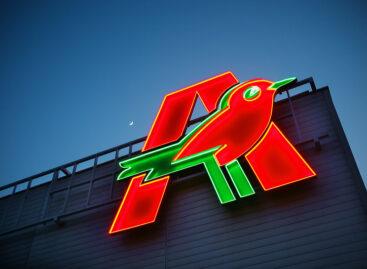Offline and in-store have transformed

Attila Váradi
owner-MD
Conint-Print
Due to the pandemic, door, window and floor stickers with health protection information, plus the placement of hand sanitisers or face masks have become part of the in-store decoration. As a new product, Conint-Print recommends the use of a protective film layer against viruses and bacteria on various surfaces, such as railings, handles, counters or even touchscreens.
Conint-Print is calling the attention of partners to energy-saving, LED-lighting aluminium frames and lightboxes, for which washable textile prints can also be ordered.
Attila Váradi, Conint-Print Kft.’s managing director told our magazine: at the moment the biggest challenges is finding the balance between the utilisation of online and offline tools. In a proactive fashion, the company demonstrates to partners how offline tools can be used – after the online dominance of the last few years.
There are many expectations when it comes to displays

Ferenc Kőhalmi
key account manager
DS Smith
DS Smith reported to us that in the spring of 2020 ongoing promotions continued, but new POS tool manufacturing plans didn’t go ahead. Now that markets are reopening all over the world, brands are relaunching their formerly postponed promotions.
According to Ferenc Kőhalmi, DS Smith’s key account manager, instead of creative in-store appearances, the demand has shifted toward displays that can be manufactured quickly and efficiently. The proportion of pre-pack displays increased the most – with these easy assembling is an important requirement. DS Smith’s opinion is that partners will keep using pre-pack displays after the pandemic too; a growing proportion of customers want them delivered assembled.
POS: In the shadow last year, in the sunlight this year

Attila Kolonics
managing director
Artmatch
Being display manufacturers, Artmatch is used to short deadlines and tough situations, but last March was an extreme period even for them.
Managing director Attila Kolonics informed that they plan with growing sales in 2021. This year’s hardships can be rising raw material prices. Mr Kolonics added that everything was about sustainable POS solutions at the 2020 Euroshop trade fair. These new innovations, materials and technologies – which were overshadowed by the pandemic – will come out to the sunlight this year.
Natural and recyclable

Gábor Balázs
commercial director
Dion Hungary
From Dion Hungary’s perspective the turmoil caused by COVID-19 finally ended this spring – revealed Gábor Balázs. He reported that besides cost-effective display solutions, more and more often partners opt for one-of-a-kind, more expensive designs that shoppers are more likely to notice. Four years ago Dion Hungary started manufacturing durable displays too; demand from these is the biggest for wooden designs, because more partners want eco-friendly solutions than before. The company selects suppliers with sustainability in mind and sends back production waste for recycling. Dion Hungary’s customers get the opportunity for familiarising themselves with any stage of the production process.
Manufacturing-related services

Judit Kántor
head of sales
Molino Reklámügynökség
Advertising agency Molino Reklámügynökség reckons that the problems in the transportation of imported displays in 2020 had a positive effect on Hungarian display making. With periodical campaigns and new product launches it is still cardboard displays that dominate, because they are easy to transport and assemble.
Head of sales Judit Kántor told Trade magazin: in the spirit of sustainability, demand surged for services related to display manufacturing, e.g. service and maintenance. Another new trend is higher quality raw materials and special graphic design, but partners should keep in mind that these can result in a longer production time.
Creativity is the heart and soul of in-store solutions

Viktor Simunek
sales director
Active Media Hungary
Active Media Hungary serves partners with 3 different advertising surfaces on shopping trolleys. The company believes that the next few years will bring a breakthrough in in-store advertising, because online platforms and social media are saturated.
Sales director Viktor Simunek said: creativity and good graphic design are the heart and soul of in-store advertisements. People like those ads which aren’t pushy, but are funny and easy to identify with. He opines that in-store marketing can compete with online campaigns in terms of both price and efficiency.
Campaigns which are interactive and groundbreaking

Miklós Izsák
sales and marketing director
JCDecaux Hungary
JCDecaux Hungary is present in the out-of-home market, which has an 8-9 percent share from total media spending and surveys predict that the post-pandemic bounce back will be the biggest in this segment. The conquest of digital citylights is unstoppable and by using the WebAR technology young urban consumers can be reached very well. JCDecaux is active in every out-of-home segment, from street furniture through billboards to the latest digital LED cylinders.
Sales and marketing director Miklós Izsák told us that they ended 2020 with interactive and groundbreaking campaigns. This April E.ON commissioned the company with building special waiting rooms, where customers could use AR technology to paint Easter eggs.
Robots on the shelves

Zoltán Soós
CEO
Wonderduck Agency
During the pandemic Wonderduck Agency Zrt. developed crisis-resistant solutions. As part of an international cooperation, they introduced in-store mini-robot Tokinomo – this sensor-driven device can have a conversation with shoppers and can be built into shelves or refrigerators; the device can even measure turnover. The company’s HomeBag4U solution reaches shoppers in their homes with tens of thousands of product samples and advertising material. Wonder Duck’s digital card Wonderpass targets the smartphones and other digital devices of shoppers.
CEO Zoltán Soós talked to our magazine about how much the company is dedicated to introducing durable POS solutions that are sustainable. He told that measurability is expected from POS tools more and more, and this can be achieved the most easily by digital tools. //
The digital signage trend

Zoltán Tóth
founder and co-owner
Trafik.hu and DigInStore
Zoltán Tóth, founder and co-owner of Trafik.hu and DigInStore Zrt. explained that digital signage is a COVID-proof and very efficient tool. In the United Sates 50 percent of businesses use it and its efficiency rate is 400 percent in comparison with classic POS tools.
In the 100 tobacco shop that trafik.hu coordinates they started building a digital POS communication system, called TrafikTV. In just three years FMCG sales doubled in the reference shops and reached or in some cases exceeded a 15-percent share. Trafik.hu’s tobacco shops retained their double-digit sales growth despite the lower customer numbers due to COVID-19. //
Digital displays

Ágnes Péczely-Tóth
marketing and sales manager
Digitálisreklám.hu
Displays, totems and kiosks in shopping centres inform customers and can also serve as advertising media. Digitálisreklám.hu Kft. develops touchfree interactive solutions (QR code, arm movement) and also uses augmented reality (AR) technology to grab the attention of shoppers.
Marketing and sales manager Ágnes Péczely-Tóth introduced one of these: WindowGrin is basically a ‘magic mirror’ that automatically recognises the facial expressions of the person standing in front of the shop window, and reflects these via the image of a virtual character – this way shoppers can control various functions on the screen. //
Related news
István Nagy: Hungarian melon season starts with good quality melons
Compared to last year, the volume of melon imports has…
Read more >Bored mobile phones are valuable – 1,500 small electronic devices were brought back to Auchan for recycling
For the third time, the Auchan department store chain has…
Read more >Retail kept its position in terms of employer attractiveness
Honouring Hungary’s most attractive employers, the Randstad Awards have been…
Read more >Related news
Corporate leaders’ commitment to sustainability at record level
According to the latest data from the K&H Sustainability Index,…
Read more >FAO food price index rose slightly in June due to higher prices of meat, dairy products and vegetable oils
The Food and Agriculture Organization of the United Nations (FAO)…
Read more >What can cause the price of a wine to increase tenfold?
There are fewer of them worldwide than the number of…
Read more >






